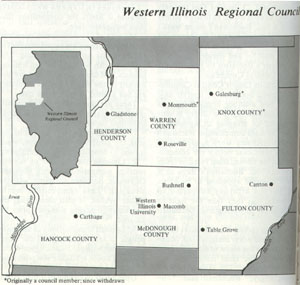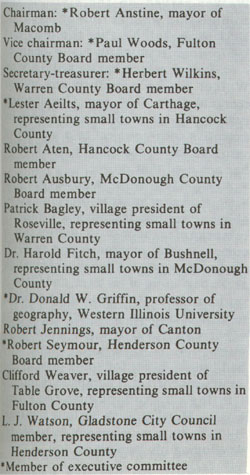By A. B. VILLANUEVA
Professor of political science at Western
Illinois University, Macomb, he has
served on several local government bodies,
most recently (1973-74) as executive
director, Mayor's Governmental Advisory
Commission, Macomb.
Western Illinois Regional Council:
supergovernment or its antidote?
FOUR YEARS ago six rural counties
joined several municipalities in Western
Illinois to form the Western Illinois
Regional Council (WIRC). Primary
impetus for this move was to get more
state money for roads in that part of the
state, but it was also thought that by
working together these governments
could provide themselves with technical
advice and assistance in seeking to solve
common problems.
Illinois has 15 regional (multicounty)
planning agencies ranging from the
Southeastern Illinois Regional Planning and Development Commission at
Harrisburg serving a population of
50,575 to the Northeastern Illinois
Planning Commission at Chicago serving almost 7 million people. WIRC,
headquartered at Macomb, serves a
population of 193,514. These regional
planning agencies may be the most
controversial form of public agency in
Illinois. Some view them with deep
suspicion as the forerunners of sub-state
regional governments. Others see them
as a form of intergovernmental cooperation which may make more layers of
government unnecessary. The Western
Illinois group has run into its own share
of flak, has suffered some withdrawals
of membership, but can also point to
accomplishments. And in one case, it
took a tornado to convince a doubting
official that WIRC was worthwhile.
The legal basis
The 1970 Constitution encourages
intergovernmental cooperation, granting the authority to local units to
cooperate with each other in obtaining,
paying for and sharing services; and
their offices and employees are authorized to participate in intergovernmental
activities without relinquishing their
offices and positions (Article VII,
section 10). The formation of regional
councils of public officials and private regional organizations is specifically
provided for by Public Act 76-913,
effective August 20, 1969, and found in
Illinois Revised Statutes (1975), chapter
85, beginning at section 1011.
WIRC was formed in 1972 by Fulton,
Hancock, Henderson, Knox, McDonough and Warren counties and cities
such as Bushnell, Canton, Galesburg,
Macomb, and Monmouth. Warren
County, Galesburg and Monmouth
have since withdrawn, but some additional municipalities as well as Western
Illinois University have joined the council.

|
Accomplishments
Although the council is only in its fourth year, it has helped members
obtain grants totaling almost $150,000
for projects as of the end of 1975, and
under its technical assistance program it has:
- Prepared a revised zoning ordinance for Macomb.
- Prepared a capital development program for Colchester and helped set up a planning commission.
- Prepared a solid waste study for Hancock County showing the best area to locate a landfill. The report was
accepted and the county has purchased the land.
- Prepared a mobile home ordinance for Hamilton which has been adopted as part of the city's zoning ordinance.
|
26 / June 1976 / Illinois Issues
Formed to get more road money, provide technical aid to local units, WIRC has suffered defections but can claim successes. A tornado made a believer out of one city official
5. Prepared a bike route for Carthage. Federal funds are now being
sought to help finance its construction.
6. Helped Bushnell obtain more than four acres of surplus federal land for
parkland use by the city.

|
Problems, too
WIRC was criticized by Monmouth
officials as an empire builder when plans
were being discussed to merge the
organization with the Southeastern
Iowa Regional Planning Commission.
"It started with a budget of $8,000 and
now it has increased to $94,000," said
Don Wills, a city planning commissioner who represented Monmouth on WIRC. Monmouth has since withdrawn from the council. Another case of
empire building, critics said, is the
attempt to merge the Western Illinois
Crime Commission with WIRC. Such
an attempt was opposed on the basis
that the crime commission might become just another committee on WIRC,
A land reclamation study conducted
by WIRC for Knox County was released by WIRC to a mining company
— prematurely in the opinion of the
Knox County Board. The board was
considering an amendment to its zoning
ordinance prescribing standards of
reclamation of strip-mining, and Knox
County officials felt WIRC should have
consulted the county board before
giving the company a copy of the report.
Officials felt the release of the report
weakened the county's position when
the company went to court to challenge
the validity of the proposed zoning
ordinance. Knox County has withdrawn from the council.
The "Forgotonia" movement also got
WIRC into trouble with Mayor Robert
F. Jennings of Canton who thought the
communications coordinator of the
council should not have helped promote
Forgotonia. The movement, which
began as a joke, was organized by a
senior student at Western Illinois
University and proposed that Western
Illinois secede from Illinois and become
the 51st state. No one took the joke
seriously, but it did serve to focus
attention on the region's concerns.
The council has faced its most serious
opposition from those who object to the
concept of a regional organization with
powers to review applications of local
governments for federal grants. It was
argued that WIRC's plan to make itself
a clearinghouse for federal grants would
lead to a third layer of government.
|
"We don't want another layer," said George
Bersted, mayor of Monmouth. "We did
not form the council on that basis," he
was quoted in the Galesburg Register Mail, January 18,1974. "All this council
needs is one stamp that says 'approval.'
All we have gotten from this council is a
newsletter saying, 'We know how to run
things.'" Monmouth later withdrew from the council.
Future outlook
Can the council survive these losses?
Galesburg has also virtually withdrawn,
and the Register-Mail ran a cartoon
showing Monmouth and Knox County abandoning the ship WIRC, and tagged
it "a hopeless cause" (January 21,1974).
Lee Rodgers, a member of the Warren
County Board, told the Peoria Journal-Star (January 25, 1974), "The need of
regional planning is not felt by the
population of Warren County."
On the other hand, TV executive
Robert Rice in an editorial by WRAU-TV 19, Peoria (September 16, 1973),
emphasized that "it will take cooperation to solve the area's problems."
Mayor Robert Anstine of Macomb,
WIRC chairman, told the Peoria paper
that WIRC was simply "a valuable arm
of government and I hope that is all it
will ever be" (February 22, 1974).
Mayor Jennings of Canton gave the
group its strongest endorsement after
the tornado that struck his city last July.
"The staff came to our city immediately
after the storm and have worked with us
every day since. Had they not been
available, I do not know what I, or the
City of Canton, should have done. They
have taken a lot of load off my shoulders
and have been able to advise me many
times," he said. Jennings, who at one
time had urged his city council to withdraw from WIRC, admitted in a letter to
Richard Gale, WIRC executive director, "We have found . . . you do not
know their [WIRC's staff] value until
they are needed. I feel that all counties
and cities within the boundaries of this
organization should belong, even
though they may never need their
services such as we have."
Membership and financing
To become a member of the council, a unit
of local government or nongovernmental
body must adopt a resolution supporting the
council. Major financial support comes
from the members' contributions, which are
based on population; in the case of Western
Illinois University, the contribution is
negotiated. For fiscal year 1976, assessments
total $24,861, exclusive of the university
contribution. The council is also receiving
federal planning funds from the U.S.
Department of Housing and Urban Development (HUD). In addition, it was
awarded a $3,000 work-study contract by
HUD and is receiving special grants
amounting to $47,000.
June 1976 / Illinois Issues / 27

